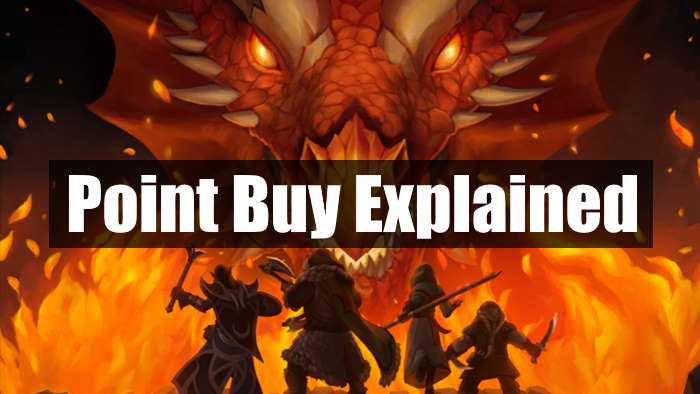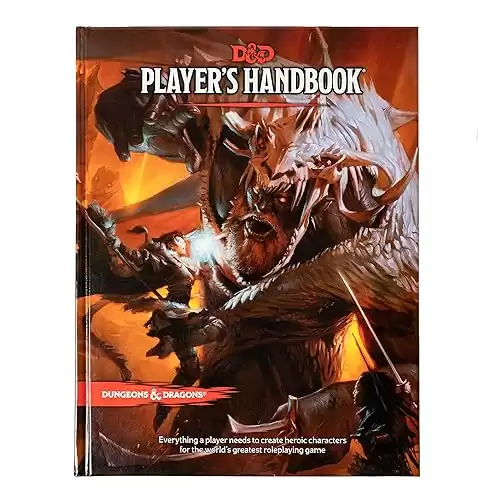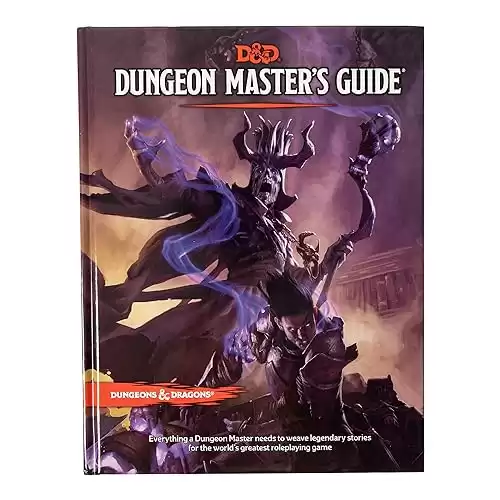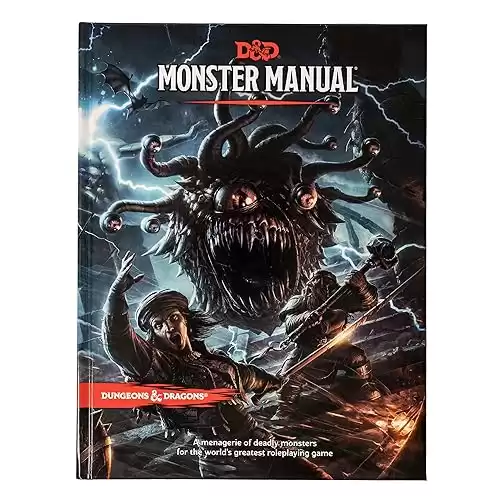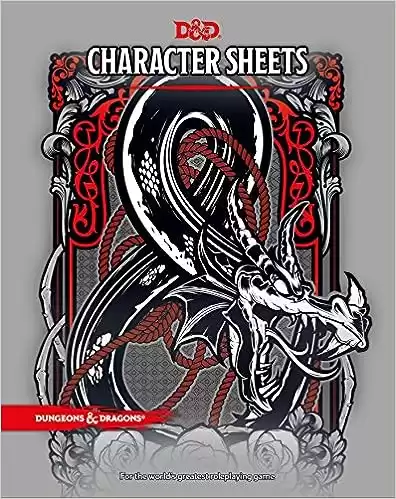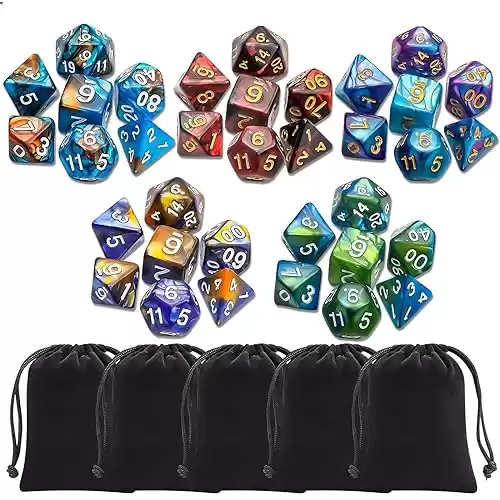One of the most exciting aspects of DnD is creating your very own character. You get to decide their personality, their backstory, and what special abilities you’ll use on your adventures. One of the most important decisions you’ll make is assigning ability scores to your character, and Point Buy is an easy, flexible method for character creation in 5e.
Point Buy is one of many ways to generate your character’s ability scores in 5e. Using this system, you have 27 points to ‘buy’ six different numbers, each ranging from 8 to 15. You can then assign these numbers to any ability score you’d like. Point Buy gives players a fair amount of agency when building characters, but it also restricts their choices through the range of possible numbers and limited points. It’s a good option for newer players, as well as for groups that want to start with similar scores.
You might be wondering how exactly this system works, or how you can get the most out of it for your own characters. No matter what questions you have, this article will take you through the ins and outs of Point Buy in DnD 5e.
What is Point Buy in 5e?
Point Buy is one of many ways to determine your character’s starting ability scores in 5e. It allows you to customize your character to some extent, but it doesn’t provide the unique or powerful builds that you can get from rolling dice.
How Does Point Buy Work in 5e?
When you create your character, one of their most defining features will be their ability scores. These scores determine your character’s skills and shortcomings, and they’ll be used in just about every phase of the game. There are six ability scores in DnD 5e:
- Strength
- Dexterity
- Constitution
- Intelligence
- Wisdom
- Charisma
Each of these traits not only affects the mechanics of the game, but also your role-playing decisions. After all, a fighter with a high Intelligence will likely be different than one with a high Charisma, even though these abilities don’t affect that class’s features. When you’re assigning numbers to these ability scores, consider both the mechanics of the game as well what kind of character would be the most fun for you to play.
Using Point Buy, you can quickly create a 5e character while still making meaningful decisions about their strengths and weaknesses. When you use Point Buy, you start with 27 points that you can use to buy ability scores. You’ll buy six numbers in total, and you can assign them to whichever abilities you’d like. You don’t have to spend all of your points, but doing so will give you the best ability scores possible.
| Ability Score | Ability Modifer | Point Cost |
| 8 | -1 | 0 |
| 9 | -1 | 1 |
| 10 | 0 | 2 |
| 11 | 0 | 3 |
| 12 | +1 | 4 |
| 13 | +1 | 5 |
| 14 | +2 | 7 |
| 15 | +2 | 9 |
As you can see, the highest number you can buy by default is 15. This means that you can’t start with a +3 modifier without the help of a racial bonus, and you can’t start with a +4. You also can’t have a lower modifier than a -1, which won’t be too tough to work around.
Pros
The strength of Point Buy is that it balances simplicity, fairness, and customization fairly well.
This system isn’t very complicated, so it’s an excellent option for new players. Because the range of possible ability scores is fairly small, you don’t have to make nitty-gritty calculations. You’ll likely prioritize your class’s primary scores, then focus on whatever best fits your character concept.
Point Buy also starts players on a fairly even footing. Even if one character has more high scores than another, they’ll have more lower scores as well. This system prevents a character from starting as overpowered or underpowered. I personally don’t think power differences between characters is a big issue, but some groups may value balance more than I do.
Finally, Point Buy acheives all of this while still giving players interesting choices. If you want more than one good score, you’ll have to sacrifice some of your other abilities. Allocating your points in the best way for your character concept is a fun puzzle, and it gives you a wide variety of possible builds.
| Pros |
| Easy to understand |
| Fairly balanced starting place |
| Provides interesting choices |
Cons
The largest drawback to the Point Buy system is that it doesn’t allow for extreme ability scores. Many players enjoy starting with a +4 in their primary ability, and some even enjoy having lower modifiers than -1.
Personally, I would always take a +4 and a -2 (or lower) if I could during character creation. Having well-defined strengths and weaknesses helps bring a character to life, and I enjoy the tension that comes with having a very low score.
There are some alternate versions of Point Buy that extend the range of ability scores. These versions let you spend even more points to get higher scores, and let you earn more points by taking lower scores. Here’s an example:
| Ability Score | Ability Modifier | Point Cost |
| 3 | -4 | -9 |
| 4 | -3 | -6 |
| 5 | -3 | -4 |
| 6 | -2 | -2 |
| 7 | -2 | -1 |
| 16 | +3 | 12 |
| 17 | +3 | 15 |
| 18 | +4 | 19 |
As a DM, you don’t have to include all of these options, but extending the range even by a couple of scores can lead to more varied and powerful characters.
| Cons |
| Doesn’t allow for extreme scores |
What Ability Scores Should I Value?
Every class uses different ability scores, so which stats you prioritize will change depending on your class. We’ll go through each class’s primary scores later, but just know that you should focus on whatever your class needs for its features, skills, and attacks.
However, some abilities simply have broader uses than others. If you aren’t sure where to put your points, some options are generally better for having a well-rounded character. Just keep in mind that you don’t have to care about all (or any) of these abilities to have a fun and functional character.
Dexterity is the strongest ability score in 5e. Initiative and stealth rolls occur frequently throughout a campaign, and every character will need to make these rolls. Most ranged weapons also use Dex, and attacking at a distance is inherently powerful. Finally, many spells and powers will require you to make a Dexterity saving throw, such as Fireball or a blue dragon’s breath weapon.
Consititution and Wisdom are also key abilities for every character. Similarly to Dex, you’ll use these saving throws during every stage of a campaign. You’re improving some of your key defenses when you invest in these ability scores.
Additionally, your Con modifier is added to your HP at every level, or subtracted if you have a negative modifier. As a result, you’ll be able to take more hits if you prioritize Constitution. Spellcasters also use Con for concentration checks, which can keep their spells around even after they take damage.
Wisdom, on the other hand, affects some of the most commonly used skills in DnD, such as Insight and Perception. Just about every character will use these skills, so investing in Wisdom can be useful no matter what class you’re playing.
How Does Race Affect Point Buy in 5e?
Below are my general recommendations for using Point Buy in 5e, but you might change how you assign your points based on your character’s race. Each race gives you bonuses to different ability scores, and that could easily change how you build your character.
It’s important to note that even numbers are better than odd numbers for ability scores. This is because each score’s modifier increases with every even number, but stays the same with the following odd number.
| Ability Score | Ability Modifier |
| 20 | +5 |
| 19 | +4 |
| 18 | +4 |
| 17 | +3 |
| 16 | +3 |
| 15 | +2 |
| 14 | +2 |
| 13 | +1 |
| 12 | +1 |
| 11 | 0 |
| 10 | 0 |
| 9 | -1 |
| 8 | -1 |
| 7 | -2 |
| 6 | -2 |
| 5 | -3 |
| 4 | -3 |
| 3 | -4 |
| 2 | -4 |
| 1 | -5 |
Let’s assume that you’re playing a Mountain Dwarf fighter who wants to get into melee. Below, I recommend that you buy a 15 for both Strength and Constitution, but your race gives you another option.
Since Mountain Dwarves get a +2 to Str and Con, you could choose to start with a 14 in those scores instead. With your racial bonus, you would have two 16s, which still gives +3. Now, you have four extra points to invest in your other abilities.
Of course, you could still start with a 15 for Str and Con, giving you two 17s. When you reach 4th level, you could give a +1 bonus to both, bumping those modifiers to a +4!
When you’re building your character, think about how their racial bonuses will affect their ability scores. You could use these bonuses to go all in on your key abilities, or you could create a more versatile, well-rounded character. There’s no wrong option, but building with your race in mind will help you make the best decision for you.
Point Buy Suggestions by Class
Now that you know how Point Buy works and which ability scores to prioritize, let’s dive into each class specifically. We’ll go over what each class needs to succeed, as well as other potential builds you could try.
As I’ve already mentioned, it’s best to have your ability scores be even numbers whenever possible. However, Point Buy doesn’t allow you to start with a score above 15. As a result, I’ll generally try to give each class either two 15s or a 15 and a 13. Doing so will give you a significant upgrade at 4th level when you improve your ability scores.
Just keep in mind that your racial bonuses can change how you allocate your points. You may need to make some slight adjustments to get the best build possible, but staying close to these numbers will give you a great starting character.
Artificer
Str: 8 Dex: 13 Con: 14 Int: 15 Wis: 12 Cha: 10
Artifcers use Intelligence more than any other ability score. It’s their spellcasting ability, and many of their features will rely on a high Int. Since they don’t particularly care about any other score, I decided to give them a 14 in Con and a 13 in Dex.
Extra HP and better concentration checks are great assets from the very start of the game, so a good starting Con is useful. Dexterity also gives plenty of benefits, such as better AC and ranged weapon attacks, but I felt like these were less important. With that said, you could build this class in a variety of ways. As long as you have a high Intelligence, you should have a good time.
Barbarian
Str: 15 Dex: 14 Con: 15 Int: 8 Wis: 10 Cha: 8
As a class that’s known for getting into melee and taking lots of hits, barbarians really want high physical stats. Strength and Constitution are both vital to this class, as they’ll let you succeed on the front lines. They also work very well with many of this class’s key strengths, such as Rage, Unarmored Defense, and Reckless Attack. Ultimately, you want to be able to deal lots of damage and take lots of hits.
Dexterity is also an important score for barbarians. Not only does it contribute to your Unarmored Defense, but it also works well with Danger Sense. At 2nd level, barbarians get advantage on certain Dexterity saving throws. Making those rolls even better can keep you incredibly safe from Fireball, Lightning Bolt, or other dangerous effects.
Bard
Str: 9 Dex: 15 Con: 12 Int: 10 Wis: 10 Cha: 15
Bards use Charisma for spellcasting, as well as for social skills like Persuasion or Performance. This is easily the most important ability score for the class, and it gives you just about everything you need.
Many bards choose to focus on Dexterity after Charisma. They have proficiency in Dex saving throws, and many of their best weapons use Dexterity. It’s also a generically useful score, as we discussed earlier, and allows you to fight with both swords and sorcery.
However, there’s another aspect of this class that many players enjoy: their skills. Bards get more skill proficiencies than most classes, and they get even more bonuses to skills with Jack of All Trades and Expertise. If you’d like to lean into having lots of excellent skills, you could move points away from Dex and Con and into Int and Wis.
Cleric
Str: 13 Dex: 10 Con: 14 Int: 10 Wis: 15 Cha: 10
Clerics have excellent options for both supporting their allies and defending themselves. Many subclasses give you proficiency with heavy armor, which gives you a very high AC. To lean into these assets, I’ve prioritized Wisdom, then Constitution, and lastly Strength.
Wisdom is the class’s spellcasting ability, so there’s no question about maxing it out. You’ll want to get this as high as possible right away, as it’ll make your spells even more effective.
Constitution and Strength are less essential. If your subclass gives you proficiency with heavy armor and/or martial weapons, then I’d stick with these scores. As a support class, you don’t want to be the first to go down in a fight. Leaning into these ability scores will keep you healthy and protected during combat.
If your subclass doesn’t grant these proficiencies, however, you’ll likely want to invest in Dexterity instead of Strength.
Druid
Str: 11 Dex: 12 Con: 13 Int: 12 Wis: 15 Cha: 10
Wisdom is the highest priority for every druid. It’s your spellcasting ability, which already makes it important, but many of your key skills also use Wisdom. Medicine, Perception, and Survival all use Wisdom, and these are skills that many druids value highly.
Aside from Wisdom, you have a lot of flexibility for building a druid. I’ve chosen to spread points out fairly evenly, but you could focus on a particular score if it fits with your concept.
Fighter
Str: 15 Dex: 14 Con: 15 Int: 8 Wis: 10 Cha: 8
You may notice that this stat block is exactly the same as the barbarian’s. Both classes will usually take the form of a front-line fighter that wants good offense and defense. I also think that Dexterity is useful for fighters so that they can switch to ranged weapons if they need to.
RELATED: DnD Weapons: A Complete Guide
However, it’s much more common for fighters to use Dexterity than it is for barbarians. For these builds, it’s easier to move points away from Str and Con if you want your mental traits to be better. You can still have a good Strength in case you want the option of using melee weapons, but it’s a worse score than Dexterity overall. As a result, you gain a lot less by prioritizing Strength when you won’t be using it frequently.
Monk
Str: 8 Dex: 15 Con: 14 Int: 10 Wis: 15 Cha: 8
Monks value both Dexterity and Wisdom quite highly. All of your monk weapons can use Dexterity, and some of your ki abilities use Wisdom. Both scores also contribute to your unarmored defense, which is important because monks don’t have any other options for armor.
I spent a lot of points on Constitution, but I think it’s a great option. Monks are primarily melee fighters, but they only get a d8 hit die. As a result, most monks rely on a high AC as their main defense. With a higher Con, however, you can stay in the fight even if your opponents roll well. Your other scores are much lower with this build, and you can shift points away from Con if that doesn’t sound appealing.
Paladin
Str: 15 Dex: 8 Con: 14 Int: 8 Wis: 10 Cha: 15
Paladins are an incredibly versatile class. They have great options for offense, defense, and support, meaning they can play just about any role. Whether you want to focus on melee combat or healing and buffing your allies, paladins can be an incredibly useful addition to any party.
Paladins get proficiency with martial weapons and heavy armor, so they’re well suited for melee combat. As a result, a high Str and Con will be crucial. Charisma is also key for paladins because it’s their spellcasting ability. A high Charisma also lets you serve as the party’s face, so it gives you utility outside of just combat.
You may have noticed that the other ability scores I’ve recommended are quite low. If you don’t care much for combat or spellcasting, you could reallocate some points. However, I think leaning into all of the paladin’s strengths will give you an excellent character with lots of utility.
Ranger
Str: 10 Dex: 15 Con: 12 Int: 10 Wis: 15 Cha: 9
Much like fighters, you can choose to play this class with either melee or ranged weapons. Personally, I like using bows whenever I play a ranger, and this is actually my favorite archetype in the game. This is partially due to the aesthetic, but attacking your foes at a distance is very powerful. You can stay safe while still dealing tons of damage, and many of your spells support this playstyle. For these reasons, I chose Dexterity over Strength.
Regardless of how you choose to fight, Wisdom will be your other key ability score. Wisdom is your spellcasting modifier, and many of your iconic skills rely on Wisdom, such as Perception and Survival.
Rogue
Str: 10 Dex: 15 Con: 10 Int: 14 Wis: 10 Cha: 13
As a rogue, Dexterity is by far your most important ability score. Your main feature in combat, Sneak Attack, only works with Dexterity weapons, and you only have proficiency in light armor. Some of your key skills, especially Stealth, also use Dexterity. Nothing will boost this class’s power level more than a high Dex.
After Dex, most players will either prioritize Int or Cha. Both scores primarily give you better skill checks, so it’s up to you whether to focus on cunning or charm. I’ve spent a fair number of points on both scores, but you could certainly lean into one more heavily than the other.
Sorcerer
Str: 8 Dex: 14 Con: 15 Int: 8 Wis: 10 Cha: 15
Sorcerers use Charisma as their spellcasting ability, so it’s important to spend a good amount of points on it. It’s also nice for someone in the party to have a solid Charisma so you can negotiate or lie on behalf of the group.
I’d also recommend spending a lot of points into improving your sorcerer’s defenses. Sorcerers don’t have any armor proficiencies, so they rely solely on Dexterity and spells to increase their AC. They also have the lowest hit die in 5e, a d6. A high Constitution can help make up for this weakness by giving you additional HP with every level.
RELATED: Dungeon and Dragons Armor and Armor Class: A Complete Guide
Warlock
Str: 9 Dex: 12 Con: 13 Int: 12 Wis: 12 Cha: 15
Warlocks are a flexible class. Once you’ve invested in your spellcasting ability, Charisma, you can go in a lot of different directions. I’ve spread the points out fairly evenly, but you could definitely focus more of them towards an ability that fits your character concept well.
Some warlocks, especially the Hexblade subclass, can switch between long-range fighting and melee combat. For these warlocks, you might prioritize physical scores more highly. Constitution is a good score for any character to invest in, but it’s even more important if you’re more likely to be attacked.
Other warlocks might lean more into gaining knowledge and hidden lore, and so you might prefer to increase your Int and Wis. These scores will give you better skill checks, and they might thematically fit your character the best.
Wizard
Str: 8 Dex: 13 Con: 14 Int: 15 Wis: 12 Cha: 10
My recommended scores for wizards are similar to those for sorcerers. After prioritizing your spellcasting ability, Intelligence, I think that improving your defenses with Dexterity and Constitution is a great idea. This is because wizards have the same defensive problems as sorcerers: no armor proficiencies and low HP.
I’ve invested fewer points into Dex and Con, however, so that you can start with a slightly higher Wis. Wizards have proficiency in Wisdom saving throws, so it also makes sense to further increase that line of defense. You could certainly tweak these numbers, but I think this is a fairly good balance.
Point Buy Calculators
If you don’t want to figure out your point total by hand, or if you just want to double-check your work, there are many Point Buy calculators online.
My personal favorite is chicken-dinner.com. It has a simple interface, and it allows you to easily change all of your ability scores so you can try out different combinations. You can also select your character’s race, so you can use your points with racial bonuses in mind. Lastly, this website also gives you the option for more extreme ability scores, which I think adds a lot of depth to the system.
Alternatives to Point Buy
Of course, Point Buy isn’t the only way to generate your ability scores. Whether you’re looking for an easier way to create your character, or you want a more exciting, more challenging system, there’s an option for you.
First, Standard Array is the easiest way to create a character, plain and simple. This method gives you six numbers to assign to your character’s ability scores, so you can start playing right away with this option. Standard Array is a great choice for new players, but experienced players might find it too restrictive.
Many players roll dice to generate their ability scores, and this is certainly the most variable and exciting way to build a character. The most popular method is “4d6 drop the lowest,” which is fairly straightforward:
- Roll 4d6
- Remove the lowest number from the pool
- Add the remaining three dice
- Repeat until you have six scores
This method will give you six random scores for you to use however you’d like. Not only can it give you more extreme scores than Standard Array and Point Buy, but it also improves the average score of each roll since you only use the three highest dice.
End of Session
If you’ve made it all the way through this article, congratulations! You’re now ready to build your very own 5e character with Point Buy. I hope this article has made you feel comfortable using this system, or excited you to play a new character.
